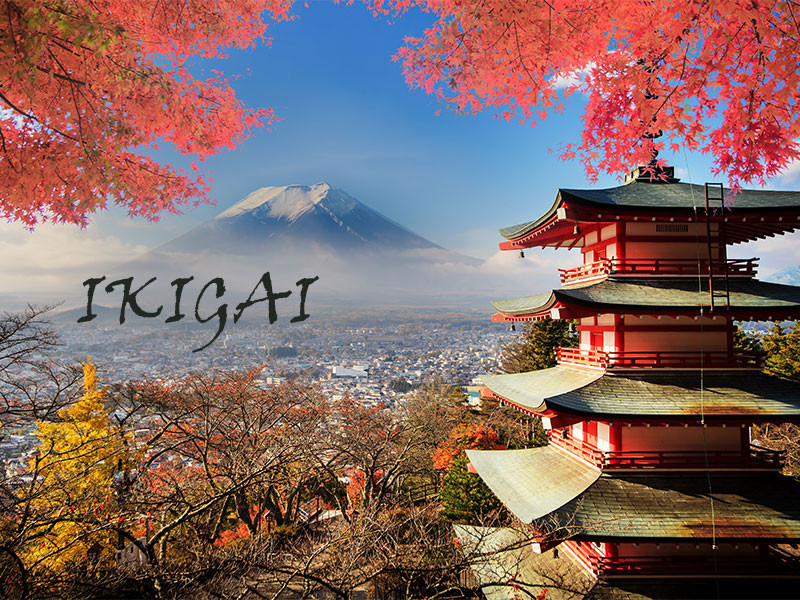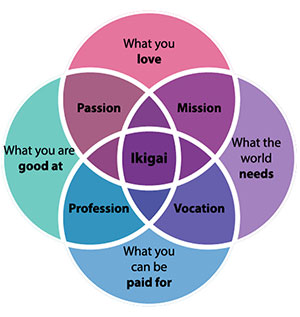Ikigai and the art of living up to the age of 100.

Who doesn't want to live to be 100 or more? Well, as long as we are healthy and can look after ourselves.
That we live many years and in good health depends on many factors, some of which are beyond our control, but others depend exclusively on our own attitude.
We all have an idea of how we should act to live healthily and become centenarians, but most of us don't put it into practice. For example, we know that stress is not good, that we should eat healthier, do exercise..., but for various reasons (laziness, lack of time, different obligations, etc.), we do not give it priority.
However, there is a certain place in the world where people reach and even exceed 100 years, and this place is Ogimi, a village to the north of Okinawa, Japan. Here there is the largest concentration of centenarians in the world.
As you may have guessed, many people have gone there to find out why these people live a long life and the things they have discovered are the following:

1. They have an ikigai.
What is an ikigai? Well, it is something like the purpose of life, or the reason for being. "Iki" means "life" and "gai" means "purpose" or "value". It is what makes you get up in the morning with enthusiasm because you have a goal to fulfill. When you have a purpose in life, you feel that it is worth living.
Apparently, we all have an ikigai, which would be the combination of what we are good at (vocation), what gives us pleasure (passion), what we can contribute to the world (mission) and what brings us financial compensation (profession).
In short, the people who find their ikigai are happier, and a full and happy life leads to living longer.
2. They work.
The inhabitants of this village do not have the word "retirement" in their dictionary, their motto is to be active until the end. Some continue with their profession, others work in the fields, others do some kind of voluntary work, etc. The difference is that the main reason for continuing to work is not because of an economic issue, but rather as a contribution to society. This is intimately related to the ikigai, since when one has a purpose, one remains active to carry it out.
3. They have a vegetable garden.
In Ogimi everyone has a small garden which they take care of every day and which gives them enough vegetables for their sustenance. However, it is not only used to give them food, it is also used to keep them active and in contact with nature. In addition, this activity gives them pleasure, something that is related to the ikigai.

4. They live not to eat, but eat to live.
For them, food is very important to enjoy good health and to be able to live for many years. They eat a wide variety of foods (an estimated 206 different foods) including lots of fruit and vegetables, fish and some meat. A meal can consist of several small dishes with different preparations. In addition, their daily salt intake is less than 7%. The most important thing, however, is that they don't eat until they're full, but stop eating before they notice they're full. In addition, they chew food thoroughly and therefore the stomach does not have to work so hard.
5. Moderate exercise.
Another common thing these elderly people share is that they exercise every day. It can be any type of exercise, from walking or cycling (in fact their feet and bicycles are their means of transportation), karate, stretching... In addition, they do not sit on chairs, but on the floor, and this gives them flexibility.
6. Social life.
This part is very important for these people and they devote a great part of the day to socializing with family, friends and neighbours. They have a great sense of cooperation with the community. They have groups of people with common interests (moais) who pay a monthly fee that gives them the right to take part in meetings, leisure activities, dinners, etc? But this money does not go to cover the expenses of these activities, it is accumulated and every two years is donated to a member of this group who needs it. This helps to strengthen financial stability and at the same time emotional stability, since money is no longer a concern.

7. Optimism and joy.
Something special about the people of Ogimi is the way they deal with life. They focus on the present and have a great capacity to adapt to the setbacks of life. They focus on their objective and do not allow themselves to be carried away by discouragement and despair. In fact, they know that when it happens something that is beyond our control and therefore we cannot change, it is not worth complaining, it is accepted and you go on. They smile a lot, they are hardly ever angry and they bear no malice to anyone. They live in the present and don't worry about the past or about what is to come in the future. The word stress does not appear in their dictionary either, they follow the formula of "walking slowly you get far".
The principles that these people follow seem to make them get older without many ailments, they stay active and feel useful until the end of their lives.
It is obvious that in our world of haste, nerves, the need to earn money to acquire objects and things that many times we do not need..., it is more difficult to be able to follow these precepts to the letter. However, perhaps we should stop for a moment and think about where we are heading for, because we are going so fast on this train of life that we might skip the station where we were supposed to get off and end up derailing.
2 comments
Praveena
says:
Praveena
says:
Comment





